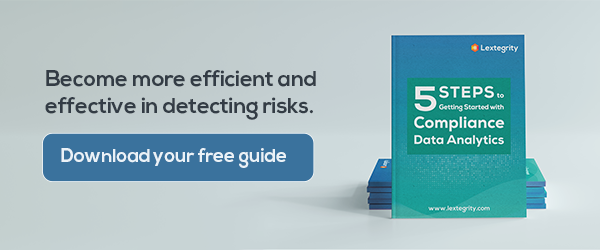Compliance has not traditionally been a technology-driven field, but data analytics is beginning to play an increasingly prominent role in the discipline. Companies have increased their focus on compliance data analytics in recent years. Advances in technology deliver superior insights about a company’s risk more quickly than traditional compliance processes. In the coming years, the trend will only increase.
Recent updates to the United States Department of Justice guidance for corporate compliance programs have made clear that the modernization of compliance processes should be a top priority for companies. Compliance programs powered by data analytics ensure that companies can meet regulators’ expectations and stay ahead in their fight against non-compliance, such as fraud and corruption.
Taking that technological leap forward can be intimidating for compliance professionals and their companies, especially when considering whether it’s best to build your company’s compliance technology from the ground up or purchase off-the-shelf software from a third party. Both choices have potential benefits and long-term implications. It is essential to consider which option is optimal for your company when taking the first steps toward modernizing your compliance program with data analytics. This article will break down the key points your company should consider when determining whether to buy or build a data-driven compliance program and the pros and cons of each option.
1. What is the budget for your company’s compliance data analytics program?
The first question companies are likely to consider when weighing the build versus buy decision is which option makes the most financial sense. Let’s begin by discussing the build option. A company with the resources to build its own data analytics solution can ensure that the program functions precisely as the company needs; in other words, you won’t be paying for features that aren’t relevant to your company. However, going the build route doesn’t mean that companies will avoid having to buy software. For example, when building a data analytics compliance program from the ground up, companies will still need to buy things such as data repositories, an ETL system, a visualization engine, a workflow app, and, often, an analytics tool. These costs can quickly add up, especially considering the financial investment required to build the actual data analytics system itself.
When transitioning to a data-driven compliance system, it’s critical to consider both the long-term and upfront costs. Buying off-the-shelf data analytics software offers several advantages. For starters, building a data analytics program is not a fire-and-forget affair. Compliance software that features data analytics needs to be frequently updated to meet your company’s evolving needs and ensure your company’s compliance processes continue to meet regulators’ changing expectations. Regularly updating internally built data analytics software can be a financial drain and a technical challenge. On the other hand, buying off-the-shelf software means partnering with a company dedicated to updating its products to address evolving customer needs.
Purchasing off-the-shelf compliance software has upfront costs and requires paying a subscription fee, but it also ensures your company will have a dedicated support team that can answer any questions about the service, assist with implementation and configuration, and train your users. Going the build route requires your company to pay data engineers and data scientists as well as forensic compliance experts that can translate compliance risks to those data scientists. You would need to either have them on the payroll or pay third-party specialists to construct and update the software as needed. If such individuals aren’t already a part of your team, dedicating resources to building compliance software could exceed the costs of subscribing to an off-the-shelf service in the short and long term.
2. Does your company have employees with the technical skill sets needed to build and maintain a compliance data analytics program?
Developing and maintaining an effective compliance platform that features data analytics is a significant technical undertaking that requires a team of experts with specialized skill sets. It’s not just about having a data scientist on the payroll; such a program requires network security experts, analytics professionals, user interface creators, data architects, and business and forensic risk experts who can ensure the system does what the company needs. These roles are irreplaceable, and companies must consider whether they have such individuals on staff—or are willing to spend the resources to hire them or outsource part of the work—if the goal is to build a compliance data analytics program in-house.
The financial cost isn’t the only consideration. Employee turnover has been on the rise across industries in the United States in recent years - the “Great Recession” that began in 2021 has made this particularly apparent - and the technology industry is notable for having an especially high turnover rate. One of the primary benefits of building compliance data analytics software in-house is that your IT team will theoretically be intimately familiar with the software. However, employee turnover means that a company is likely to lose at least some institutional knowledge about its own software due to personnel changes, and the range of internal roles described above only multiplies this risk.
Buying off-the-shelf compliance data analytics software can help companies avoid these issues by partnering with a supplier that already has a cross-functional team of experts who are experienced with the product and can be held accountable. The supplier is responsible for maintaining their software and updating it with new analytics, integrations, and features without requiring your company to retain in-house experts. Furthermore, although IT teams at companies seeking to buy compliance data analytics software often express concerns about whether the buy option will increase their workload or force them to work with unfamiliar technology, effective off-the-shelf data analytics programs are designed to be user-friendly and easy to integrate into companies’ pre-existing workflows.
3. What is the scope of your company’s data analytics needs, and how will such software be used in the
long-term?
Your company’s compliance needs and regulatory expectations for compliance programs will change over time. These changes will impact how you approach integrating data analytics into your compliance software, regardless of whether your company chooses to build software or buy off-the-shelf technology. In the build case, it is essential to consider future software updates and whether your software will be customizable enough to make necessary upgrades for years to come.
A potential benefit for companies building their own software is that when done correctly, the company should have complete control over when and how upgrades are applied and will be able to integrate the software with the company’s other tools seamlessly. On the other hand, a high-quality compliance data analytics software should include configuration flexibility and ease of integration in the products. Companies looking to purchase data analytics solutions should also evaluate the track record and support capabilities of the vendors they consider.
Whether your company builds or buys compliance data analytics software, it’s critical to have a concrete idea of your company’s compliance needs in the short and long term. On one level, this is a basic idea: Is a compliance program that has third-party transaction monitoring and automated pre-approval processes among the top priorities?
However, other factors to consider might not be as immediately apparent. For example, will your system need to work on multiple operating systems, such as Windows and Mac? Will the system only be accessed via desktop machines or also used on mobile devices? What kind of visualizations will the system be able to output, and how accessible will those visualizations be for non-technical users? In what region will the system’s data be stored, and will that location cause regulatory complications?
All of the questions mentioned above are important to consider, regardless of whether your company goes the build or buy route. If your company has decided to build its own compliance data analytics software, it’s crucial to have answers to these points in mind before development begins. If your company is looking to buy, a provider’s ability to satisfactorily answer those questions should be considered. Compliance data analytics providers offer free demos of their suite of services, which are invaluable to determine if a given vendor is the right match for your company.
Conclusion
The benefits of bolstering your company’s compliance processes with data analytics are becoming more apparent than ever. However, it can still be challenging to determine whether it’s best to build or buy data-driven software that can meet your company’s needs.
Lextegrity was founded by former in-house compliance experts who wanted to build the kind of platform we wished we had while we were in-house. We know how challenging it can be to build a data analytics platform from the ground up and understand compliance professionals' questions when considering buying off-the-shelf compliance software. We’ve been there!
If you’re in the position that many of our experts were and would like to schedule a discussion about the options your company has to modernize its compliance programs, you can contact us here.







